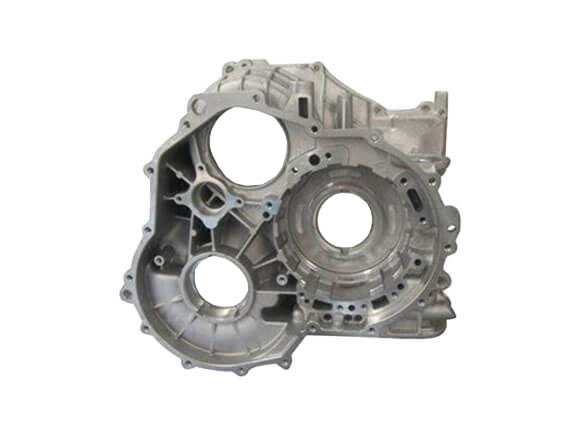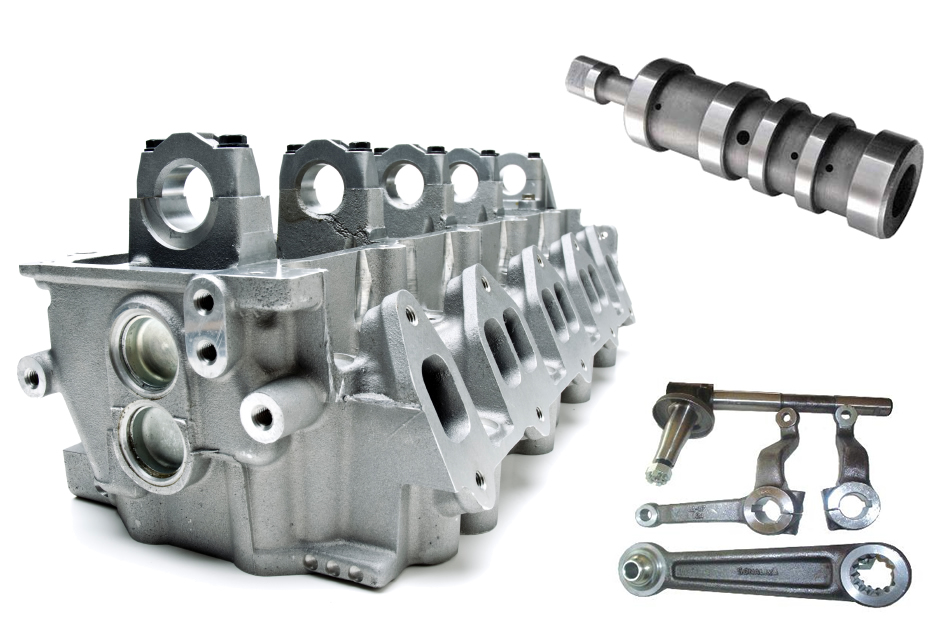Checking out the Role of Shop Solutions ahead of time Modern Design Solutions
Shop services are necessary in shaping modern-day design solutions - aluminum casting. They link the gap between standard manufacturing methods and the needs of modern markets. With innovations in automation and sustainability, foundries are developing to satisfy the requirements of sectors such as aerospace and vehicle. This makeover questions concerning the effects for products, processes, and future developments. What obstacles and possibilities exist in advance for factory services in this rapidly altering landscape?
The Advancement of Shop Providers in Engineering

The assimilation of computer-aided style (CAD) and simulation software program has actually changed the design and manufacturing processes, making it possible for factories to produce complicated geometries with higher accuracy. The change towards eco-friendly methods has actually led to the fostering of greener innovations and recycling efforts within shops. As markets progressively focus on modification and fast prototyping, shop solutions have broadened their capabilities, guaranteeing they stay important contributors to the design landscape. This evolution highlights the foundry's essential duty in sustaining improvements across numerous fields, including auto, aerospace, and power.
Trick Processes and Methods in Modern Foundries
Modern factories employ a selection of essential procedures and strategies that enhance the performance and high quality of steel casting. Amongst these, sand spreading remains common because of its convenience and cost-effectiveness. The usage of innovative innovations, such as computer-aided layout (CAD) and computer-aided production (CAMERA), enables exact modeling and production, guaranteeing high precision in part dimensions. Additionally, financial investment casting is preferred for generating complicated geometries with outstanding surface coatings.
Automation and robotics boost production speed and consistency while reducing labor costs. Techniques like additive manufacturing are significantly integrated to create detailed molds and cores, therefore decreasing material waste. The application of thermal analysis help in maximizing casting processes by controlling and predicting solidification habits. Collectively, these procedures and methods exhibit how modern-day foundries are adapting to satisfy the demands of contemporary engineering obstacles, ensuring remarkable product high quality and operational effectiveness.
The Importance of Products Option in Foundry Services
Selecting the appropriate products is crucial in factory services, as it directly influences the mechanical residential properties, durability, and general performance of the final item. Various products have one-of-a-kind qualities, such as tensile strength, deterioration resistance, and thermal security, which must line up with the designated application of the actors components. As an example, metals like light weight aluminum and steel are commonly selected for their strength-to-weight ratio, while alloys can enhance details performance attributes.
Furthermore, the selection procedure entails thinking about elements such as availability, manufacturability, and cost, which can notably affect project timelines and budgets. Additionally, innovations in material science allow the advancement of innovative compounds and specialized alloys that cater to arising engineering obstacles. A complete understanding of product homes and their ramifications is necessary for engineers and foundry professionals to accomplish effective outcomes in their tasks. This cautious choice process inevitably enhances the reliability and efficiency of the end items.
Shop Solutions in Aerospace and Automotive Applications
Foundry services play a crucial role in the aerospace and automotive industries, where precision and performance are paramount. These markets depend greatly on the production of facility parts that must meet rigorous quality standards and hold up against severe problems. Foundries offer essential services such as casting, machining, and completing, making sure elements are light-weight yet robust, vital for boosting gas performance and safety.
In aerospace, foundry services add to the production of wind turbine blades, engine components, and structural parts, every one of which need complex designs and high-performance materials. Similarly, in the automobile sector, foundries supply engine blocks, chassis elements, and transmission cases, concentrating on toughness and weight decrease.
Advanced factory strategies, including additive manufacturing and accuracy casting, are significantly used to meet the particular needs of these markets. By using customized services, shop solutions assist drive advancement and preserve competitive benefits in the fast-evolving aerospace and automotive landscapes.
Innovations Driven by Foundry Capabilities
Many technologies in engineering are sustained by the innovative abilities of foundry solutions. These services enable the manufacturing of complicated geometries and high-performance products that are vital for modern applications. For example, additive manufacturing, typically called 3D printing, has seen considerable improvements with shop methods, enabling for the fast prototyping of intricate layouts. In addition, the capacity to cast light-weight alloys has reinvented industries such as aerospace and vehicle, leading to enhanced fuel effectiveness and performance.
Moreover, factories are significantly integrating wise modern technologies, such as automation and information analytics, to boost manufacturing performance and quality control. These advancements not just decrease waste however additionally allow customization at scale, satisfying the certain needs of customers. By leveraging innovative factory capabilities, engineers can discover new frontiers in item style and capability, eventually driving progression throughout various industries and establishing a foundation for future improvements.
Future Patterns in Foundry Providers and Design Solutions
The future of shop services is shaped by emerging patterns such as lasting production practices, which prioritize ecological responsibility. Automation and smart innovations are readied to enhance effectiveness and precision, while increasing personalization and flexibility will certainly satisfy the evolving needs of clients. As these fads develop, they will certainly redefine the landscape of engineering options in you can try these out the factory industry.
Sustainable Production Practices
As markets significantly focus on environmental duty, lasting production practices within foundry solutions are coming to be vital to contemporary design remedies. These methods concentrate on decreasing waste, decreasing power usage, and making use of environmentally friendly materials throughout the manufacturing process. By implementing methods such as reusing scrap metal and optimizing melting processes, foundries can significantly decrease their carbon footprint. In addition, the adoption of life cycle assessments allows suppliers to evaluate the environmental influence of their items from beginning to disposal. Collaborating with suppliers committed to sustainability even more boosts the efficiency of these efforts. Eventually, accepting sustainable production not only lines up with global ecological objectives yet additionally fosters development and competition in the swiftly progressing engineering landscape.
Automation and Smart Technologies
While several industries are embracing technological innovations, foundry solutions are experiencing go to my blog a substantial transformation with automation and clever technologies. The combination of robotics and automated systems enhances production effectiveness, minimizes human mistake, and accelerates the manufacturing process. Smart innovations, such as IoT and AI, allow real-time monitoring and predictive maintenance, which maximize functional performance and decrease downtime. These developments promote data-driven decision-making, enabling factories to react promptly to market demands and enhance item high quality. Additionally, automation minimizes labor costs and boosts work environment safety and security by taking care of dangerous jobs. As foundry services continue to take on these developments, they are poised to redefine engineering remedies, leading to increased competitiveness and sustainability in the manufacturing market.
Personalization and Flexibility Trends
Arising fads in foundry solutions increasingly stress modification and flexibility to fulfill special consumer demands. This change shows a more comprehensive need for customized design services that adjust to details job needs and industry requirements. Companies discover this info here are spending in innovative innovations, such as additive manufacturing and electronic modeling, allowing them to create customized components efficiently and cost-effectively. Consequently, shops are relocating far from one-size-fits-all methods, supplying customers the capacity to customize styles and products in real-time. Furthermore, partnership in between engineering groups and foundry services is becoming a lot more incorporated, promoting development and increasing time-to-market. This trend not just improves product performance yet likewise sustains sustainability by minimizing waste via precise manufacturing processes.
Regularly Asked Inquiries
What Are the Regular Expenses Linked With Factory Solutions?
Common costs connected with shop services consist of material expenditures, labor costs, devices use charges, and expenses costs - Aluminum Foundry. These costs can differ commonly based upon project intricacy, volume, and particular demands of the engineering solution entailed
For how long Does the Shop Refine Generally Take?
The foundry process generally takes anywhere from numerous weeks to a few months, relying on variables such as intricacy, product demands, and production quantity, which can greatly affect timelines and overall project shipment.
What Industries Advantage The Majority Of From Factory Solutions?
Industries such as vehicle, aerospace, and construction benefit significantly from foundry services. These industries depend on accuracy spreading and metal construction to produce intricate parts, enhancing product performance and operational efficiency in their respective applications.
What Qualifications Should Foundries Possess?
Factories ought to possess certifications such as ISO 9001 for high quality management, ISO 14001 for environmental administration, and details sector qualifications like AS9100 for aerospace or IATF 16949 for automobile, making certain conformity and top quality assurance.
How Do Foundries Ensure Top Quality Control in Their Processes?

Shop services are crucial in forming modern design services. As design techniques have actually progressed, the role of foundry solutions has actually changed considerably to meet developing industry needs. As industries progressively focus on modification and fast prototyping, shop services have actually broadened their capacities, guaranteeing they stay vital factors to the engineering landscape. As sectors increasingly focus on environmental obligation, lasting manufacturing techniques within shop services are coming to be important to modern-day engineering solutions. Furthermore, cooperation in between engineering groups and foundry services is becoming a lot more integrated, fostering advancement and speeding up time-to-market.